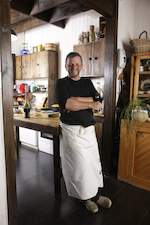'I have often wondered if winemaking was where I belonged. But I know now that, while I firmly believe in the fundamental role of the vineyards and the science and art of vinification in making great wine, in my case the greatest reward lies in the sensory experience of wine.
Vintage 28

I derive deep pleasure from the flavour of wine, like the flavours in food, the texture of asparagus, the smell of juniper berries. It's why I enjoy the odd cigar. I suppose I'm a sensualist.'
After nearly 30 vintages Philip Costandius has arrived at a place of contentment in his winemaking career. This is not to say this introspective, thoughtful, soul-searching man is not still nurturing dreams of what to do next in wine. 'I had an idea that I wanted to...' is how he leads into most quiet revelations about what he's done, what he's tried, what he’s discovered and what he enjoys in life.
'Cooking is therapeutic. When I’m feeling thoroughly hot under the collar after a stressful day, I cook. It calms me. A woman I did a baking course with said if you have a score to settle, bake a loaf of bread. The kneading works all the anger out of you and has a constructive outcome.'
Phillip Costandius has worked under a handful of big names and big personalities, experiencing both family business and corporate enterprise. He's handled big tonnages, made practically every style of wine and kickstarted new vineyards and hi-tech cellars.
It began with 16 vintages at Delheim with patriarchal, flamboyant 'Spatz' Sperling, a German World War II émigré, self-taught vintner and 1970s and 1980s Cape Winelands pioneer. Then it was on to Neethlingshof, part of German financier Hans Schreiber's portfolio of wine farms in partnership with Distillers, for three vintages. Next came the development of Lourensford for South African banker and businessman Christo Wiese, whose wine portfolio includes historic Lanzerac.
Despite the consistent performance of his wines at all these properties, his was always a low-key profile. He likes to describe his decision to start making wine for himself about four years ago as ·a dream deferred'.
Now he's enjoying the freedom of doing things in his own time, which comes with overseeing his tracts of vineyard on contracted growers' farms and consulting on small start-ups for others with dreams of making wine. 'I like sharing knowledge.'
It's reflected in the choice of brand name: Solo. 'People sometimes have a simple, quite a literal take on the label as meaning me going out on my own, "flying solo". But it really has to do with the concept of individuality, singularity: of the person, of the variety.' Although he enjoys blending - he also makes a cabernet sauvignon-led blend called The Guildsman - he prefers working with single varieties.
'One of the things I appreciated most about my time at Delheim was that Spatz gave me so many opportunities to travel: France, Germany, Spain, Italy, California, Australia, Chile... Of course, it always had to be motivated, I had to organise it myself, make my own appointments and give a report-back on what I'd learnt and could apply at Delheim.'
 Peruvian ceviche recipe by Phillip Costandius paired with Solo Viognier wine....
Peruvian ceviche recipe by Phillip Costandius paired with Solo Viognier wine.... Casserole with venison, lamb and pancetta recipe by Phillip Costandius paired with Solo Syrah wine....
Casserole with venison, lamb and pancetta recipe by Phillip Costandius paired with Solo Syrah wine....